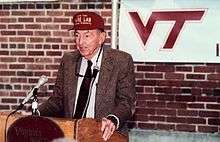Joseph F. Ware, Jr.




Joseph Fulton "Joe" Ware, Jr. (November 8, 1916 – April 23, 2012)[1] was a flight test engineer at Clarence "Kelly" Johnson's famed Skunk Works in the Lockheed Corporation on the U-2, the SR-71 Blackbird, and many others from World War II, becoming Department Manager of Engineering Flight Test. He was the son of Joseph F. Ware, Sr.
Early Life and education
Ware was born in his mother's room, "the room over the living room", as he used to say, at 404 Clay St., Blacksburg, VA, and he was raised in the same house. His bedroom was in the west corner (back and left) of the 2nd story, "the room over the kitchen". He enrolled in Virginia Polytechnic (now Virginia Tech) at age 15 and attended the Guggenheim Aeronautical Laboratory at the California Institute of Technology aged 20, graduating with a Master's in Aeronautical Engineering a year later in 1938.
Early career
Ware worked as a test engineer at the Wright engine test facility at Paterson, New Jersey, then instructed mathematics at Virginia Polytechnic, when he was hired as a flight test engineer at Lockheed in 1941,[2] a few months before the attack on Pearl Harbor in December 1941.
Career at Lockheed
Ware was the flight test engineer in charge of numerous advanced military and reconnaissance aircraft at the Skunk Works, Lockheed, from 1941 to 1974, including but not limited to the Hudson Bomber, the P-38 Lightning, the AT-22 (Flight Engineer Trainer, Sheppard Field, TX) during WW-II, the YP-80A, all radial-engined and turbo-prop variants of the Constellation, including (serial number) "1961" (Howard Hughes' former personal airplane which was used at Lockheed as an engine and prototype testbed) and the WV-2 (as well as the WV-2E roto-dome prototype), Columbines II and III (which were Air Force Ones for President Dwight D. Eisenhower), the P-2 series, the YP-3V1 Orion prototype and series including the P-3A&B, the YC-130 Hercules, the Model 286, Lockheed's XH-51 and AH-56 Cheyenne helicopters, the F-104 Starfighter, Lockheed's space shuttle proposal, and was also Department Manager of Engineering Flight Test for the U-2 and the SR-71 Blackbird.[3] Area 51 was made a test base for the U-2 and was later used for flight testing the A-12 and the SR-71.[4] Gary Powers was shot down over the Soviet Union in a U-2 in 1960, depicted in the movie "Bridge of Spies." During its service life, no SR-71 was shot down.
Many good friendships were formed during his career, including one of his test pilots Tony LeVier and those shown in these photographs with his former employee then President of Hughes Aircraft Jack Real, Vice President at Lockheed Willis Hawkins, and Gil Cefaratt, Lockheed tech rep and technical writer.
In retirement
Ware served in the Civil Air Patrol. After retiring from Lockheed in 1974, he engaged in an active career in the U.S. Coast Guard Auxiliary, attaining the rank of Commander. A lifelong pilot, and holding a Commercial certificate, Joe Ware flew flag officers of the Coast Guard in his personal aircraft and engaging in search and rescue operations with same, and anti-terrorist activities with the Coast Guard on his boat. As well, he and his third wife, Jennifer "Jenna" Ware of seventeen years owned numerous airplanes, including but not limited to a Beechcraft Duke, a T-28, and an award winning 1937 SR-9B Stinson "Gullwing" Reliant. He enjoyed showing them and more at air shows large and small including major military air bases, from Miramar (then the U.S. Navy's Fighter Weapons School, featured in the film "Top Gun") to Edwards Air Force Base.
Ware also founded the Joseph F. Ware, Jr. Advanced Engineering Laboratory at Virginia Tech.[1]
References
- 1 2 "About Joseph F Ware Jr". VirginiaTech College of Engineering. Retrieved 13 June 2014.
- ↑ Good, Timothy (2012). A Need to Know: UFOs, the Military and Intelligence. Pan Macmillan. p. 195. ISBN 978-0-330-54349-1.
- ↑ Cefaratt; Gill (2002). Lockheed: The People Behind the Story. Turner Publishing Company. pp. 78,158. ISBN 978-1-56311-847-0.
- ↑ Jacobsen; Annie (2011). Area 51: An Uncensored History of America's Top Secret Military Base. Back Bay Books. pp. 45–62, 124–139. ISBN 978-0-316-13294-7.